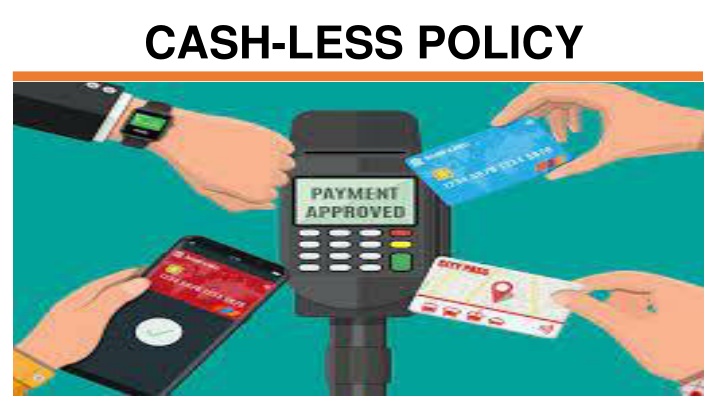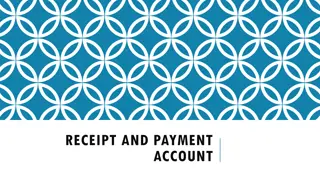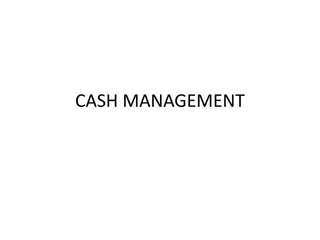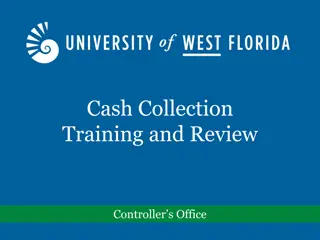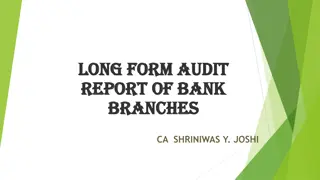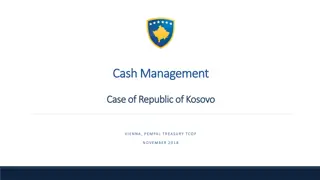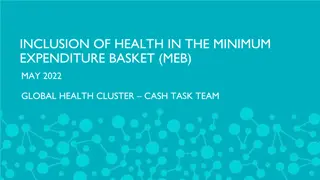CASH-LESS POLICY
Central Bank of Nigeria's Cash-Less Policy aims to reduce cash circulation, promote electronic transactions, and combat financial vices. Learn about the features, implementation, and benefits of this initiative.
Download Presentation

Please find below an Image/Link to download the presentation.
The content on the website is provided AS IS for your information and personal use only. It may not be sold, licensed, or shared on other websites without obtaining consent from the author.If you encounter any issues during the download, it is possible that the publisher has removed the file from their server.
You are allowed to download the files provided on this website for personal or commercial use, subject to the condition that they are used lawfully. All files are the property of their respective owners.
The content on the website is provided AS IS for your information and personal use only. It may not be sold, licensed, or shared on other websites without obtaining consent from the author.
E N D
Presentation Transcript
Introduction to Cash-less Policy Central Bank of Nigeria (CBN) Features of CBN Cash-Less Policy Processing fee charge on OTC cash withdrawal above threshold Processing fee charge on OTC cash lodgment above threshold Limit on 3rd Party cheques Promotion of the use of electronic payment channels Reduction on ATM and POS cash withdrawal threshold Tedious process of OTC cash withdrawal above threshold The Cash-less Policy aimed to reduce the amount of cash-in-circulation (CIC) in the economy (not to eliminate the use of cash) and encourage the use of e-channels of transaction. The Cash-less Policy was introduced in 2012 in Lagos state as Cash-less Lagos and later extended to five (5) other states and the FCT in 2013. The policy has been reviewed and updated overtime with it s current iteration circulated and implemented in November 2022 following the announcement of the CBN Naira Redesign. Source: CBN
Why Cash-less Policy? Nigeria is cash-based economy with retail and commercial payments primarily made in cash. Study showed that cost of cash to Nigeria s financial industry is high and increasing. The cost includes: Cash in Transit Cash Processing Vault Management Destruction of old notes Cash is an integral element that fuels several vices in Nigeria, alternative payment channels will have considerable positive consequences on the economy through the reduction of the following vices: CASH High cost of cash handling and processing borne across the value chain Permits revenue leakage arising from significant handling of cash Inefficient treasury manageme nt due to nature of cash processing Encourages money laundering and terrorist financing Limitation of monetary policy Robberies Kidnapping
The Cash-less Policys journey so far Cash-less Policy announced Cash-less Policy scale up Cash-less Policy reinstated Enhanced cash-less policy implementation CBN releases First Statement on desire for a Cash-less Policy The Cash-less policy beings in Abia, Anambra, Rivers, Kano, Ogun and FCT on October 1, 2013 with processing fee charged on OTC cash transactions above the threshold CBN reinstates the policy in the six (6) states and the FCT, with plans for all other states in the works2, including charges on cash deposit above the threshold on September 18, 2019, following a review of infrastructural improvement CBN kick-offs of the Enhance Cash-less Policy sensitization and implementation alongside the Naira Redesign Campaign in all 36 states of the Federation and the FCT on January 9, 2023 2011 2012 2013 2014 2019 2022 2023 Cash-less Lagos commences Cash-less Policy suspended Enhanced Cash-less Policy announced Implementation of the Cash-less Policy begins with a pilot run dubbed Cash-less Lagos on January 1, 2012. Focuses on awareness and drive for adoption of alternative payment channels (electronic). Charges on OTC3 cash transaction above the threshold commenced on April 1, 2012 CBN suspends the Cash-less policy, including charges on cash deposit above the threshold. Focuses on facilitating financial inclusion and improving (FAP1) infrastructure that enables the policy CBN announces the Enhanced Cash-less Policy following the announcement of the Naira Redesign. The circular was released on November 15, 2022 to that effect. Charges are placed on OTC3 cash transactions (withdrawals and deposits) that were above set above the set threshold in the form of processing fee. This charges are applied to the excess over the threshold. The selection of states was based on the volume and value of financial transactions with Lagos piloting the policy in 2012 due to the sheer volume of transactions and significantly advanced financial service infrastructure at the time. The additional states scaled-up to in 2013 were also significantly recording high volume of transactions. 1. FAP Financial Access Point; 2. Other states implementation planned for March 31, 2020 but halted due to COVID-19; 3. OTC Over-the-counter Source: CBN
Benefits of Cash-less Policy Stakeholder Benefit area Optimize tax revenue collection Increased economic growth ((positively correlation with increased payment efficiency) Increased financial inclusion The introduction of cash-less policy in Nigeria has facilitated the growth of electronic payments and increased availability, reliability, and security of electronic channels. Government Faster, easier payments Increased convenience/ access (more payment options) Reduced risk of robbery Consumers It has also increased financial inclusion in the country. Emergence of Fintech in the country is because of the platform that Cash- less Policy has created. Better access to capital due to shorter payment processing times Increased efficiency of payment processes and accounting Reduced revenue leakages More efficiency treasury management Corporations Efficiency through electronic payment processing Reduce cost of operations (cash handling) Increased banking penetration Banks
Impact of the Cash-less Policy Increase in electronic transactions Expansion of access to banking services (Financial Inclusion) Reduction in cash utilization Financial Inclusion in Nigeria1(%) Volume of e-transactions2 (Million) Value of e-transactions2 (Trillion) Volume of Cash Transactions2 (Trillion) 63.2 162.9 22.4 1400 44.4 8.4 45.6 1.1 2016 2020 2012 2020 2012 2020 2012 2020 The cash-less policy has had a significant impact on the Nigerian economy since its introduction in 2012. According to the CBN, the policy has resulted in a significant reduction in the volume and value of cash transactions, while electronic transactions have increased significantly. As of December 2021, there were over 133.5 million active bank accounts in Nigeria3. Source: 1. Enhancing Financial Innovation & Access. (2020). EFInA Access to Financial Services in Nigeria 2020 Survey; 2. Central Bank of Nigeria. (2021). CBN Annual Report 2020; 3. NIBSS
Impact of the Cash-less Policy (Contd) Impact Details Electronic payments are faster and more convenient than cash transactions, reducing the time and effort Improved Efficiency of Payments required to complete transactions. This has led to a reduction in the cost of cash handling and transportation, which has aided in the reduction of loan processing cost. The cash-less policy has also resulted in cost savings for individuals, businesses, and the government. The Lagos State Government estimated that the policy had saved about 40 billion in cash handling Increased Cost Savings costs between 2012 and 2019. Additionally, the World Bank estimated that the cost savings from the use of electronic payments could be as high as 3% of Nigeria's Gross Domestic Product (GDP). The use of electronic payment channels has improved transparency and accountability in financial Improved Transparency and Accountability transactions, reducing the incidence of fraud and corruption. The electronic trail left by digital payments can be used to track transactions and detect fraudulent activities, improving the overall integrity of the financial system.
Benefits of Cash-less Policy on Credit Allocation Benefit Area Details The cash-less policy's use of electronic payment channels creates a digital trail that enhances auditing. This enhances credit allocation efficiency by offering better visibility into borrower credit history and repayment behavior. Financial institutions can use this information to make informed lending decisions and minimize default risks. Increased Transparency and Accountability The cash-less policy makes it simpler for people to access banking services, boosting financial inclusion. This provides an opportunity to improve credit allocation efficiency by expanding the pool of potential borrowers and increasing credit portfolio diversity. Financial institutions can also develop products and services that cater to underserved or unbanked populations. Improved Financial Inclusion Electronic payment channels reduce the cost of cash handling and transportation. This can enhance credit allocation efficiency by reducing the cost of loan origination and processing. Financial institutions can leverage these savings to invest in new technologies or expand lending capacity. Reduced Cost of Cash Management Electronic payments are faster and more convenient than cash transactions. This reduces the time and effort required to complete transactions, enhancing credit allocation efficiency by streamlining the loan application and approval process. Financial institutions can collect loan applications, verify borrower information, and disburse loans quickly, reducing the turnaround time for loans. Increased Speed and Convenience of Payments The digital trail left by electronic payments can be leveraged to improve risk management in credit allocation. Financial institutions can use this data to monitor borrower behavior and identify potential warning signs of default. This can help them take proactive steps to mitigate risks and reduce the likelihood of loan defaults. Improved Risk Management Electronic payment channels provide a better customer experience, which enhances credit allocation efficiency. Financial institutions can use digital channels to provide better customer service, such as 24/7 access to account information, quick and efficient loan application processes, and easy loan repayment options. Better Customer Service
Conclusion The cash-less policy has had a significant impact on the Nigerian economy, promoting financial inclusion, improving payment efficiency, and reducing the cost of cash handling. These benefits can be harnessed to improve the efficiency of credit allocation in Nigeria by promoting transparency and accountability, expanding the pool of potential borrowers, reducing the cost of loan origination and processing, streamlining the loan application and approval process, improving risk management, and providing better customer service. Policymakers and financial institutions should continue to leverage the benefits of the cash- less policy to drive financial inclusion and promote economic growth in Nigeria.
